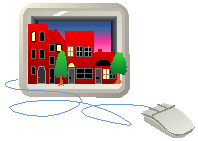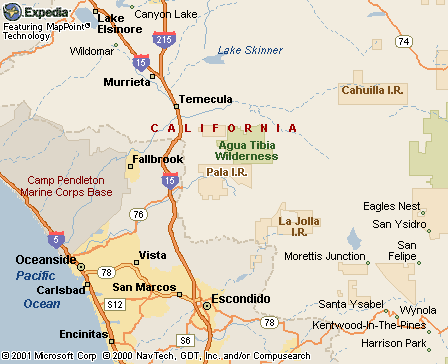|
|
Canku Ota |
|
|
(Many Paths) |
||
|
An Online Newsletter Celebrating Native America |
||
|
May 4 , 2002 - Issue 60 |
||
|
|
||
|
Program Delivers World of Connections |
||
|
by Christine
Millay Staff Writer San
Diego Union-Tribune
|
||
|
|
 PALA
INDIAN RESERVATION – Even though Ashleigh Skaggs has never been
in the same room with her math tutors, she says they helped boost
her grade from an F to a B last year. PALA
INDIAN RESERVATION – Even though Ashleigh Skaggs has never been
in the same room with her math tutors, she says they helped boost
her grade from an F to a B last year.
Ashleigh and other students who live on the reservation communicate with their tutors via microphones, computer monitors and Web cameras. The tiny cameras are placed near each machine. The tutors, all students at the University of California San Diego, are stationed at the school's outreach communication center in La Jolla. A high-speed Internet system connects the UCSD facility with a computer lab at the Pala Learning Center on Pala Mission Road. Ashleigh, 14, now a freshman at Fallbrook High School, said working with the tutors helps her stay focused. "They make me do my work," she said. "At first I wouldn't want to do it." The tutors are available for Pala students of all ages. After school every weekday but Friday, buses drop off students from Bonsall Elementary, Sullivan Middle School and Fallbrook High at the learning center. Children also walk over from Vivian Banks Charter School, an elementary campus near the learning center. Tutors work with students from 2:30 p.m. to 5 p.m. Most of them handle math and science questions, although they can help in other subjects. Besides Pala, UCSD has tutors helping students at Gompers Secondary School in southeast San Diego. More than 160 students have participated in the program since it began a year ago, said Michael Dabney, a university spokesman. Eventually, UCSD wants to make the program available to students on other reservations. The 52 tutors earn $11.87 an hour. They must keep a journal about their work and attend a weekly seminar called the Tutor Preparation Institute. Besides helping students improve their grades, Hernandez said, the tutors are asked to promote higher education by answering questions about college life, classes and financial aid. "We have high expectations of them," said Rafael Hernandez, director of UCSD's early academic outreach program. Saving time and developing personal relationships are among the advantages of tutoring via Web cams, UCSD officials say. Tutors don't have to make the 45-mile commute to and from the reservation. And the contact between tutors and students allows the children to feel they are face-to-face with influential older people, who not only encourage them to get better grades, but to attend college as well. "Our tutors are not only tutors, they're mentors also," said Geneva Fitzsimmons, American Indian coordinator for the university's early academic outreach program. The learning center has four computers with Web camera hookups. Students communicate with the tutors by speaking into a headset with a microphone. The cameras allow students to see their tutors on their computer monitor. The tutors see students the same way. Students choose which tutor they want to work with by scanning a list of those participating, and using the mouse to click on their selection. The network is part of a project called the Tribal Digital Village, which is funded by a $5 million grant that the Southern California Tribal Chairmen's Association received from Hewlett-Packard Co. Tutor Sandra Banuelos, a junior at UCSD, said she visits the learning center at least one day a week so the students can work with her in person. "I love coming out here," said Banuelos, 20. "You get a reward by just helping them. It's fulfilling." Darla Scott, 9, said the tutoring program has helped her memorize multiplication tables. "I had trouble with the nines," Darla said, adding that her math grade went from a C to a B. |

|
www.expedia.com |
|
|
||
|
|
||
| Canku Ota is a free Newsletter celebrating Native America, its traditions and accomplishments . We do not provide subscriber or visitor names to anyone. Some articles presented in Canku Ota may contain copyright material. We have received appropriate permissions for republishing any articles. Material appearing here is distributed without profit or monetary gain to those who have expressed an interest. This is in accordance with Title 17 U.S.C. Section 107. | ||
|
Canku Ota is a copyright © 2000, 2001, 2002, 2003 of Vicki Lockard and Paul Barry. |
||
 |
 |
|
|
The "Canku Ota - A Newsletter Celebrating Native America" web site and its design is the |
||
|
Copyright © 1999, 2000, 2001, 2002, 2003 of Paul C. Barry. |
||
|
All Rights Reserved. |
||